Witch, Wiccan, Crafter, Collector of Bottles and Lover of Striped Socks.
Don't wanna be here? Send us removal request.
Text
267 notes
·
View notes
Text

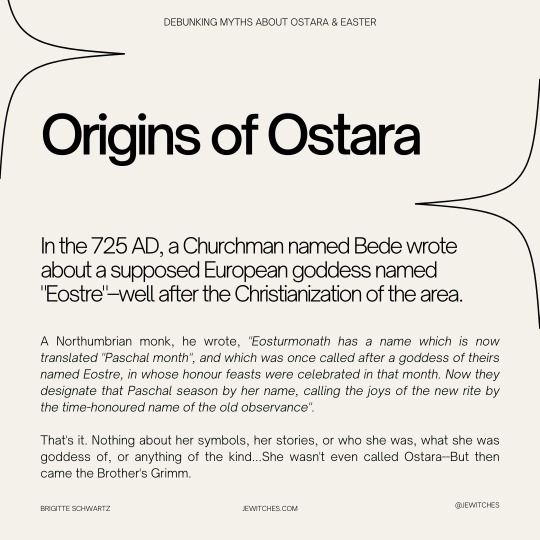
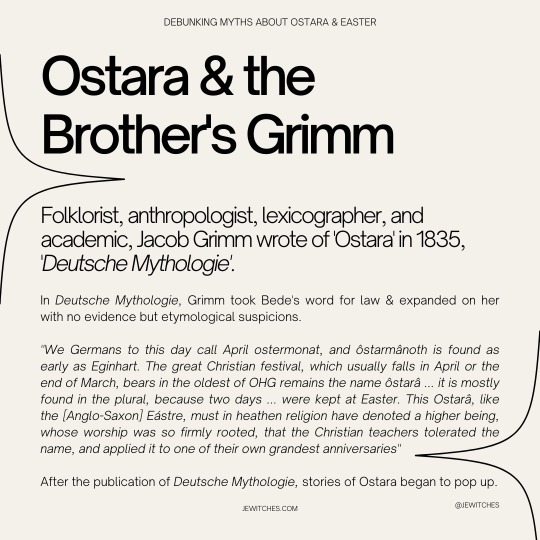


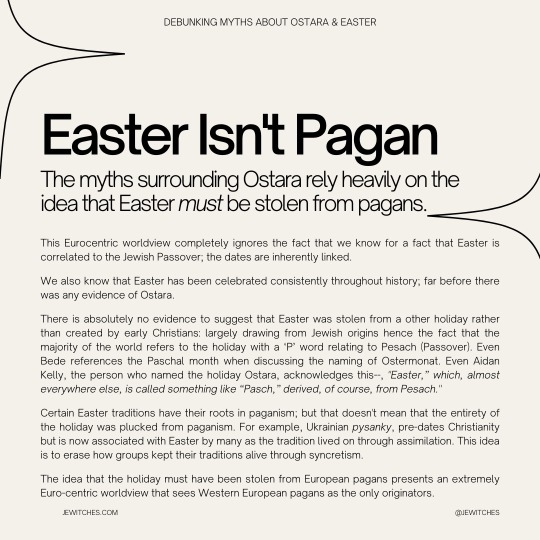
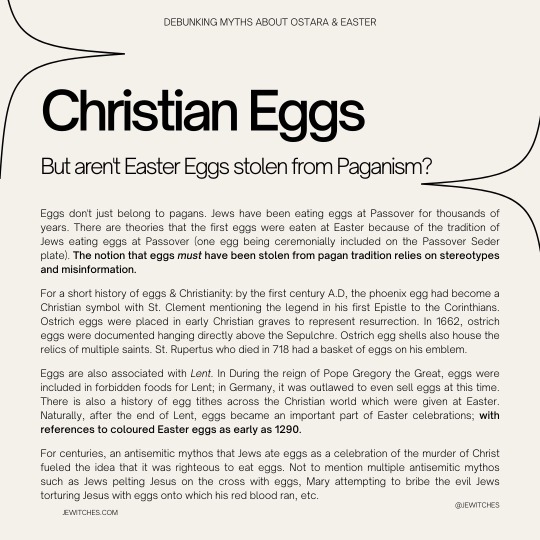
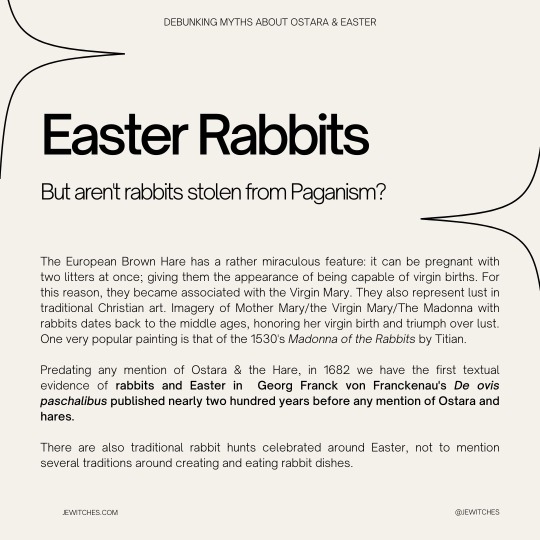

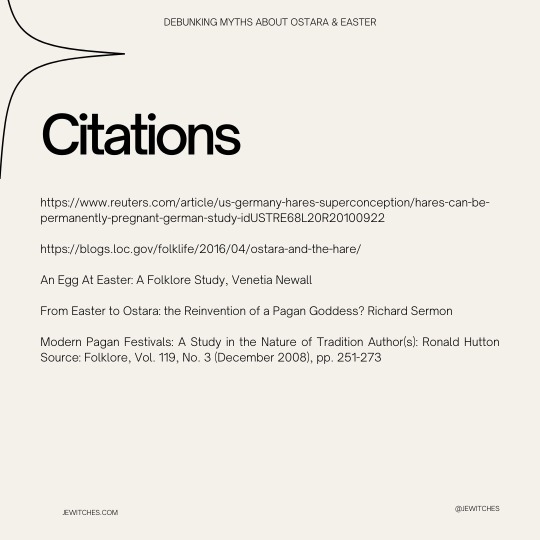
Every single year, without fail, we deal with the fact that the internet is obsessed with promoting the misinformation that Ostara must have been stolen from Easter.
People will argue until they’re blue in the face…But they won’t provide citations or evidence to the contrary and the reason why is simple: there isn’t any.
If you find that celebrating Ostara brings you joy: we aren’t here to rain on your parade or stop you in the slightest.
But misinformation, even misinformation that sounds cool and serves to further rhetorical goals, is still wrong and harmful.
So, after years of promising it, we’ve finally delivered: Easter isn’t stolen from Ostara.
Have questions? We’re happy to answer!
Make sure to follow our Instagram @jewitches for the ongoing discussion!
6K notes
·
View notes
Text
As tumblrs resident archmage, I'm deciding that if you want to get into witchcraft, magic, and or the occult, you must be anti-conspiracist. It is your ethical duty to cultivate a garden of conspiracy education so you can spot it in the wild and kill it as fast as possible.
Here, have the first episode of the Behind the Bastards on the Protocols of the Elders of Zion, the OG conspiracy theory.
3K notes
·
View notes
Text
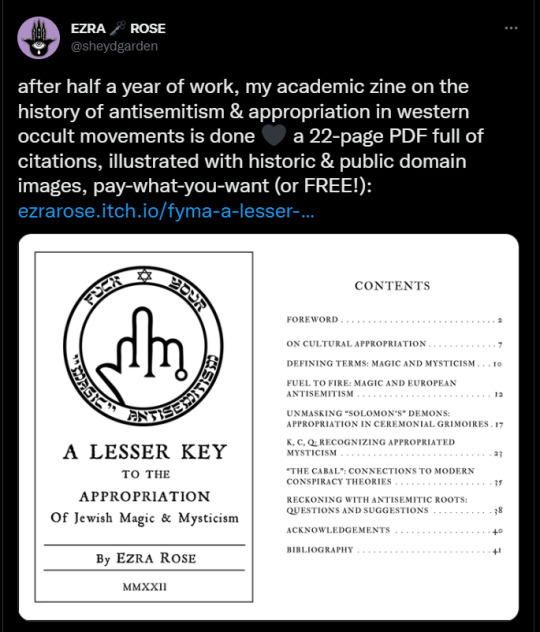
So this looks like a good read. Text: after half a year of work, my academic zine on the history of antisemitism & appropriation in western occult movements is done 🖤 a 22-page PDF full of citations, illustrated with historic & public domain images, pay-what-you-want (or FREE!): https://ezrarose.itch.io/fyma-a-lesser-key
twitter thread
19K notes
·
View notes
Text
If you're interested in weather witchcraft and magic, this book is your best friend, hands down:

No, it's not a "witchy" book, but I can't recommend it highly enough. It will teach you the basics of reading the weather around you at any given moment and help you learn to identify patterns that forecast what is to come - all without the help of a radar or fancy weather gadgets. This can help inform your practice and ritual timing. I have it in digital, audio, and now physical forms because it's really just THAT good.
827 notes
·
View notes
Text
I never feel more like Granny Weatherwax than I do when people in my goth gardening group say things like "who else keeps to the Old Ways™ and does their gardening according to astrology?"
Ma'am, that is nonsense. We plant seeds at specific times of year because that's how seasons work. By all means celebrate the turning of the year, what with that also being how seasons work, but don't rely on your horoscope to tell you what to do and then come crying to me saying Mercury in retrograde ruined your cabbages.
3K notes
·
View notes
Photo

Queen of Wands and Page of Wands
It’s your turn to teach the beginner class. Good luck!
131 notes
·
View notes
Text
Do Spell Components Matter?
My personal take on the matter as an experienced witch.
I see a lot of things online (mostly Tumblr and Tiktok) saying that you can substitute any ingredients, words, components, or conditions around in a spell and it will still work because of intention. Don’t have candles? Use plastic. Don’t have Angelica? Just use whatever’s in your cupboard. And it has a lot of baby witches running around with spells that were never going to work. If intention was the ONLY thing that mattered or effected things- why bother with spells at all? Why not just think really hard and call it a day? So this post is aimed at people who want to use spells and want to consider correspondences and meanings in those spells.
Now I’m not saying you CAN’T substitute. You absolutely can, and sometimes should. But you need to know why that aspect was added in the first place to know if that is up for substitution or not.
In a sense, spells are like recipes.
Let’s say you want to make chili and the main parts of a chili are beef, tomatoes, chili peppers, onions, and kidney beans.
But you’re vegetarian: ok no beef, that’s cool. Still taste like chili.
You don’t have fresh chili peppers: That’s ok too, most people use powder or a seasoning packet anyway. But if you don’t have that you just use the closest spicy thing in your cupboard. In fact, onions can be treated the same way.
You don’t like tomato’s: That’s alright but…..without that acidic element something is…different.
And you dont have kidney beans so you use black eyed peas and now…..well it’s a soup but it’s….not necessarily recognizable as chili.
You didn’t make chili. You probably have a good soup but it’s not quite chili.
Now if your purpose of making chili was to make a yummy spicy bean soup, hey no worries! You did it! You make a yummy spicy bean soup! Tummy is filled. But if you wanted chili, or were asked specifically for chili, you’ve missed your mark. You also can’t show up with a pumpkin pie or a cup of coffee and call it the same- well you can, but it’s probably not going to have the same reception as the one you wanted from a chili.
So let’s back up. You need to make chili, it has to taste like chili, but you don’t have anything you need. You find mushrooms to replace the savory umami of beef, chili powder to replace the spice of a real chili, garlic to replace the bite of an onion, cinnamon to add that special something where the tomato was, and pinto beans to replace kidney and hold on that’s a LOT like a chili. Because you understood why each ingredient was there and what it brought.
Now let’s compare this to a spell. Your love spell ask you to burn a pink candle surrounded in a wreath of rose petals. If the spell is using the candle to send that wish up and out into the world then- well you really must burn a candle (or at least a slip of paper) but a white one will do! And maybe you don’t have roses, but you’ve always thought of oak trees representing love to you, well that’ll work but it may take on a more sturdy and earth tone but that’s probably fine!
So yes:
Tl;dr: You can substitute. But think your substitutions through and make informed and intentional substitutions.

1K notes
·
View notes
Text
#paganproblems but why must people trauma-dump in public spiritual space
#twice this weekend and i'm so tired#i was just trying to run a meeting and do you know how many dead relatives were talked about? too many
1 note
·
View note
Text
I know that it is hard for a lot of people with religious trauma to accept. But Christianity wasn't necessarily universally forced upon ancient Europeans. I mean, yes, sometimes it was (especially if it was intertwined with competing political forces... like in Poland). But it was also very common that people just willingly converted. I think people have the right to grieve, I suppose, for their loss of what we call now call pre-christian "Paganism." However I find it incredibly frustrating that white American neo-pagans claim that they are somehow equally victims of the Church's role in colonization and violence as indigenous people are.
8K notes
·
View notes
Note
Funny how you don't like the word worlock because of it's origins but think the word witch is gender neutral. It's literally the feminine form of the word. You're just cosplay as a personality trait.
Oh sweety, you fucked up.
I repost this from time to time, so I'll do it again.
A practitioner of Witchcraft is a Witch regardless of gender.
Witch is a gender neutral term. Has been more most of the English language’s history too.
The Modern English “Witch” comes from the Middle English “Wicche.” The Middle English “Wicche” was, of course, a gender neutral version of the Old Englsh “Wicce” and “Wicca” – which were gendered. “Wicce” being the feminine form, and “Wicca” being the masculine.
You may recognize the masculine Old English word as it lends itself (albeit with a different pronunciation) to the most common form of modern day Witchcraft – the religion Wicca.
Outside of the Modern Witchcraft Movement, if we poke into history you’ll find that during the European Witch Trials men were tried as – you guessed it – Witches. While those trials did disproportionately affect women, that was mostly because of, well, western culture just hating women in general. Many men were also accused though, and when they were, they were called Witches.
(And let's be clear -- I'm not trying to conflate the Witch trials with the modern Witchcraft movement -- but when we're talking about the meaning of a word, we need to consider its full context.)
Warlock is a word meaning “oath breaker” (specifically breaking an oath to Jesus Christ) and didn’t start getting widespread use for “Male Witches” until 19th century fiction. That fiction eventually entered the pop cultural consciousness – but those practicing Witchcraft have almost never actually used that word (save for a few who have decided to “reclaim” what they consider a slur).
Witch is gender neutral. You're an idiot.
#fucking thank you#it means oathbreaker and refers to a VERY SPECIFIC OATH#'it's a slur' okay christian day
455 notes
·
View notes
Text
Do Spell Components Matter?
My personal take on the matter as an experienced witch.
I see a lot of things online (mostly Tumblr and Tiktok) saying that you can substitute any ingredients, words, components, or conditions around in a spell and it will still work because of intention. Don’t have candles? Use plastic. Don’t have Angelica? Just use whatever’s in your cupboard. And it has a lot of baby witches running around with spells that were never going to work. If intention was the ONLY thing that mattered or effected things- why bother with spells at all? Why not just think really hard and call it a day? So this post is aimed at people who want to use spells and want to consider correspondences and meanings in those spells.
Now I’m not saying you CAN’T substitute. You absolutely can, and sometimes should. But you need to know why that aspect was added in the first place to know if that is up for substitution or not.
In a sense, spells are like recipes.
Let’s say you want to make chili and the main parts of a chili are beef, tomatoes, chili peppers, onions, and kidney beans.
But you’re vegetarian: ok no beef, that’s cool. Still taste like chili.
You don’t have fresh chili peppers: That’s ok too, most people use powder or a seasoning packet anyway. But if you don’t have that you just use the closest spicy thing in your cupboard. In fact, onions can be treated the same way.
You don’t like tomato’s: That’s alright but…..without that acidic element something is…different.
And you dont have kidney beans so you use black eyed peas and now…..well it’s a soup but it’s….not necessarily recognizable as chili.
You didn’t make chili. You probably have a good soup but it’s not quite chili.
Now if your purpose of making chili was to make a yummy spicy bean soup, hey no worries! You did it! You make a yummy spicy bean soup! Tummy is filled. But if you wanted chili, or were asked specifically for chili, you’ve missed your mark. You also can’t show up with a pumpkin pie or a cup of coffee and call it the same- well you can, but it’s probably not going to have the same reception as the one you wanted from a chili.
So let’s back up. You need to make chili, it has to taste like chili, but you don’t have anything you need. You find mushrooms to replace the savory umami of beef, chili powder to replace the spice of a real chili, garlic to replace the bite of an onion, cinnamon to add that special something where the tomato was, and pinto beans to replace kidney and hold on that’s a LOT like a chili. Because you understood why each ingredient was there and what it brought.
Now let’s compare this to a spell. Your love spell ask you to burn a pink candle surrounded in a wreath of rose petals. If the spell is using the candle to send that wish up and out into the world then- well you really must burn a candle (or at least a slip of paper) but a white one will do! And maybe you don’t have roses, but you’ve always thought of oak trees representing love to you, well that’ll work but it may take on a more sturdy and earth tone but that’s probably fine!
So yes:
Tl;dr: You can substitute. But think your substitutions through and make informed and intentional substitutions.

#YES THANK YOU#spells#it's not that you Can or Can't change anything#you just need to think about the WHY and the WHAT FOR
1K notes
·
View notes
Text
Like okay, sure, by all means reject Wiccan ideology in your craft. It’s not for everyone and for good reason and there’s plenty of other ways to practice witchcraft.
But then you can’t turn around and talk about “an it harm none” and the three-fold law as if they’re tenets of all witchcraft and not specifically Wicca. The Wiccan Rede was written by a Wiccan initiated by the inventor of Wicca. It’s not anything to do with witchcraft.
Oh boy I love when books conflate neo-Wiccan ideas with “all witchcraft” and treat paganism as some nature-loving monolith, then turn around and go “but Wicca bad though, gross”
It might be the neo-Wiccan equivalent of “yeah I hate religion, there’s no sky-daddy, pfft”.
#wiccan two cents#i'm trying not to come across as a defensive wiccan here because that's not my point#my point is please research your sources and know what you're goddamn talking about
7 notes
·
View notes
Text
Oh boy I love when books conflate neo-Wiccan ideas with “all witchcraft” and treat paganism as some nature-loving monolith, then turn around and go “but Wicca bad though, gross”
It might be the neo-Wiccan equivalent of “yeah I hate religion, there’s no sky-daddy, pfft”.
#wiccan two cents#listen i'm all for legitimate criticisms of wicca that's literally why i'm here#but talking like a teen witch in their first wicca phase while dismissing 70 years of progress and analysis is just....sigh
7 notes
·
View notes
Text
Since it’s Halloween season...
The Salem Witch Trials were NOT CAUSED BY ERGOT OR LSD
NO ONE was burned at the stake
Tituba was NATIVE AMERICAN, NOT AFRICAN
SIX MEN were killed
NO ONE who was killed was a practicing witch
WICCA DIDN’T EXIST YET
There is only ONE INSTANCE of (traditional English) magic being used, the woman apologized and was never prosecuted
Most of the people involved were from SALEM VILLAGE, but the trials DID actually take place in SALEM TOWN
Thank you and have a nice day
4K notes
·
View notes
Text
Just a reminder: Heathenry does have a term for smoke-cleansing. Recaning. To recan. (Or reocan, in Old West Saxon.) This is cleansing via smoke, whether through incense or a bundle of herbs put together for a particular type of cleansing. Juniper and mugwort are both favorites for this. In case you’re wondering how to pronounce it, it sounds like reekening. The word “reeks” is actually derived from it, signifying a potent smell. For Old Norse fans, this seems to be related to the work reykr. In case you were wondering, Reykjavik in Iceland translates to “Smoky Bay”.
16K notes
·
View notes
Photo

Hello! Welcome to a new bunch of book recommendations.
This one focuses on witches and divination in history!
Some of the books on this list also appear elsewhere in my annobib posts, but that’s mostly because they tend to address multiple topics.
I decided to go ahead and post this tonight because I saw some folks in the tags asking for witch history-related reading material! I decided to include Tarot/etc history books here, too, since they’re related.
You can find more book recommendations via the #annobib tag on my blog, all organized into lists by topic! There’s also an index, here!
Encyclopedia of Witchcraft, by Judika Illes. Even better than the Weiser Field Guide to Witches - this book is huge and chock-full of information. It’ll explain in easy-to-understand language how the concept has developed throughout time, why witches do what they do, and different types of witches.
The Weiser Field Guide to Witches, by Judika Illes. This gives an excellent look at the historical lore concerning witches, from the perspective of a witch herself. It’s kind of tongue-in-cheek, but it does have some information that won’t be found elsewhere.
Triumph of the Moon, by Ronald Hutton. An inside no-holds-barred look at the history of Wicca and Modern paganism. Highly recommended. This is sort of the book that fluffbunnies don’t want you to read.
Stations of the Sun, by Ronald Hutton. Curious about what ancient pagan practices actually looked like? This book mostly focuses on festivals in ancient times and their relationship to the cycle of the year, but it’s a neat look into ancient lore.
Book of Lies: The Disinformation Guide to Magick and the Occult, by Richard Metzger. Lots of facts and history of magick in the context of Postmodernity. This is different from the Crowley text of the same name, which I wouldn’t recommend unless you want to focus on his tradition.
The Place of Enchantment, by Alex Owen. This is a purely historical text that documents the occult revival within the context of Modernity. I remember it being very good, but please realize I haven’t really picked it up much since graduating, and it might just have served my mindset at the time.
Witches, Werewolves and Fairies, by Claude Lecouteux. Mostly focused on the history of what we now call hedgecraft. Details many accounts of astral journeying experienced by both pagans and Christians in earlier times, and gives a good description of the concept of the astral double, the architecture of the soul, and other topics throughout history.
Demons and Spirits of the Land, by Claude Lecouteux. Great, detailed information about spiritwork practices throughout time, in both pagan and later Christian contexts. Lecouteux is a favorite of mine, in case that wasn’t clear!
Modern Wicca: A History From Gerald Gardner to the Present, by Michael Howard. Wicca is not my purview, but this was an interesting book covering the latter half of the 20th century’s occult milieu, by a Gardnerian initiate.
Perdurabo: The Life of Aleister Crowley, by Richard Kaczynski. If you’re interested in the history of ceremonial magic and how it influenced witchcraft, this is one to check out. It’s a biography of the notorious Aleister Crowley, and gives a good picture of the Golden Dawn’s history, as well.
Secrets of the Waite-Smith Tarot, by Marcus Katz and Tali Goodwin. This book focuses just on the history, symbolism, and creative process of the Waite-Smith deck. It gives you an inside line on just what Pixie Smith was thinking when painting specific scenes, and is a great look at her life’s work, as well.
Mystical Origins of the Tarot, by Paul Huson. While this book contains the normal “Tarot beginner” info, it also features a vast history section tracing the Tarot throughout time. Worth a read, but very dense and a bit obtuse at times.
Tarot Time Traveler, by Marcus Katz. An unusually-organized, highly personal look at Tarot history and the people who shaped it. Also features historically-inspired Tarot spreads and other cartomantic exercises.
The Tarot: History, Symbolism, and Divination, by Robert M. Place. This book will not teach you to read Tarot, but does give an actual, accurate portrait of the history of the phenomena, which is incredibly important and useful. Know your history.
Dark Star Rising, by Gary Lachman. Well, uh, this is more current events than history, but this is an attempt to trace how various occult movements influenced the election of Donald Trump, modern populism, and the rise of the so-called alt right.
853 notes
·
View notes